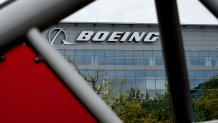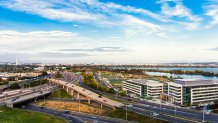Aerospace giant Boeing is moving its global headquarters to Arlington, Virginia, from Chicago and is creating a research and technology hub in the D.C. region, the company announced Thursday.
Boeing President and CEO Dave Calhoun said the move will put corporate workers in close proximity to key government and military stakeholders. It'll also better position the company — which is the U.S.'s largest exporter employing 140,000 people — to attract "world-class engineering and technical talent," Calhoun said in a statement.
Gov. Glenn Youngkin, a Republican, and Democratic Sen. Mark Warner have been working on the deal for some time. Warner said he started conversations last year and Youngkin has a personal relationship with Calhoun, a Virginia state official said. A large incentive package was not involved in the relocation discussions, this official said.
We've got the news you need to know to start your day. Sign up for the First & 4Most morning newsletter — delivered to your inbox daily. >Sign up here.
The move was first reported by the Wall Street Journal on Thursday.
News4 sends breaking news stories by email. Go here to sign up to get breaking news alerts in your inbox.

Boeing, a corporation with a market capitalization of $89 billion, makes commercial airliners like the 787 Dreamliner and 737 as well as military cargo planes, fighter jets, satellites and rockets.
Local
Washington, D.C., Maryland and Virginia local news, events and information
In recent years, the company has been rocked by production woes, regulatory issues and the worldwide grounding of 737 Max jets after two deadly crashes overseas that claimed 346 lives. The 737 Max has since returned to service without issue. Production delays and cost overruns forced Boeing to post a $1.2 billion net loss in the first quarter of 2022. Calhoun also said the airplane maker lost $1.1 billion on a 2018 deal between his predecessor and the Trump Administration to produce new, specially-modified 747 jets to be used as Air Force One.
Boeing already has a large presence in Arlington's Crystal City section with its Defense, Space and Security unit centered there. That division moved from St. Louis in 2017 to be closer to government and military decision-makers.

The company's commercial aviation division is headquartered in Seattle, Washington, and its services division is focused in Plano, Texas. Calhoun said Boeing will continue to operate an office in Chicago but with a reduced physical footprint.
As part of the announcement, Boeing said it will build a research and technology hub in Northern Virginia. The new hub will focus on cybersecurity, autonomous operations, quantum sciences and software and systems engineering.
Last year, the company announced it would donate $50 million to Virginia Tech's new $1 billion innovation campus in nearby Alexandria. Calhoun is a Virginia Tech graduate.
"As the former Governor of Virginia, I was proud to secure Virginia’s standing as the best state for business and the best-managed state, among other honors, and I’ve been proud to work in my role as Senator to help continue to cultivate the kind of pro-business environment that world-class companies like Boeing need to grow and thrive,” Warner said in a statement.
"I look forward to working with Boeing to attract even more talent to Virginia especially given its reputation for engineering excellence. From day one, our goal has been to make Virginia the best place to live, work, and raise a family," Youngkin added in his own written statement.
Arlington is already home to several aerospace and defense contractors like Boeing. Amazon is building its satellite headquarters complex — nicknamed Amazon HQ2 — in Crystal City as well.
While Virginia lawmakers applauded Boeing's move, not all legislators are happy. House of Representatives Transportation Committee Chair Peter DeFazio (D-Ore.) blasted the decision.
“Moving their headquarters to Chicago and away from their roots in the Pacific Northwest was a tragic mistake,” DeFazio said. “Moving their headquarters again, this time to be closer to the federal regulators and policymakers in Washington, D.C. is another step in the wrong direction. Boeing’s problem isn’t a lack of access to government, but rather its ongoing production problems and the failures of management and the board that led to the fatal crashes of the 737 Max.”



